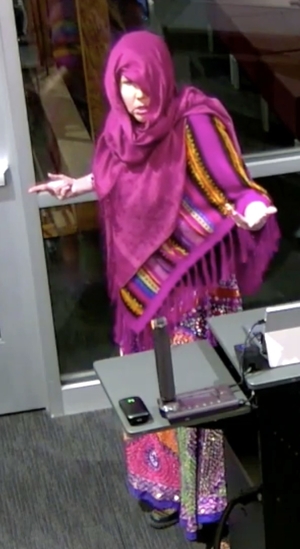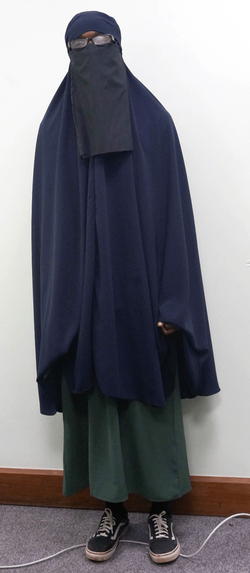Odds and ends that don't fit into my many other writings (click here for the bibliography listing them) about the world's ugliest, most uncomfortable, most repressive, and most dangerous item of female clothing, aka Black Moving Objects or BMOs.
Saudi tribal custom forbid husband ever seeing his wife's face: A tribe in Saudi Arabia's Al-Kharj region forbids anyone from seeing a woman's uncovered face, including her husband and children. Raid Qusti summarizes in the Arab News a report of interviews in Sayidaty, a Saudi woman's magazine. I have looked for the full Sayidaty version, but without success, so here follows the Arab News summary:
It often happens that
the first time even a daughter sees her mother's face is after the mother's death. "I always dreamt of seeing my mother's face because I am a woman like her," resident Hissa Al-Massareir told the magazine. "But because of customs and traditions in the family, this was impossible. It was only when my mother died that my dream came true," she added.
Al-Kharj native Muhammad Abdullah has never seen his wife's face. "We've been married for ten years and I've never seen it, not once," he said. The burqa — the garment that covers all of head except the eyes — "is stuck to her face 24 hours a day," he said. This is not for want of trying. "One day I tried to remove the burqa while she was asleep. She was furious. She left and went to her parents' house and returned only after I had signed an undertaking that I would never attempt to do such a thing again."
Saud Al-Otaibi also found his wife fiercely loyal to the custom. "I tried to blackmail my wife by saying I'd marry another woman if she didn't show me her face," he said. But he was in for a surprise. "Instead of giving in she said, all right, marry someone else. And she set me up with a friend of hers who wasn't so strict in her adherence to the custom, and I married her."
Others report that they have become so used to not seeing the faces of even close relatives that they would be shocked if they did. "I have never seen my mother's face," Ahmed Bikhait told the magazine. "I tried many times but was always rebuffed. By now I'd think it weird if she suddenly unveiled her face," he added.
A woman in her sixties explained that this tradition, like many others, is disappearing fast. "We have inherited these customs from time immemorial, and they are normal to us," she said. "But of course our children don't believe in these traditions any more."
The imam of a mosque in the region, Ayid Al-Dosari, said there was no sin in a woman unveiling her face to her husband or children and the phenomenon had to be attributed to tribal customs rather than religion. "This has nothing to do with Islam," he said. "It's simply one of the traditions that some tribes follow. In Islam, a husband can, of course, see the whole of his wife's body. The face is the least he's entitled to," he said. "But these are inherited customs and these people follow them. There is nothing I can do about that," he added.
Comment: This brings a burqa joke to mind: A child, crying, can't find his mother in the supermarket. The store clerk says, "What does your mother look like?" The child replies, "I have no idea." (September 4, 2003) May 19, 2008 update: London's Daily Mail offers some examples of husbands not seeing their wives faces over periods of decades. The first anecdote concerns a husband who, after 30 years of marriage, tried to peer under his 50-year-old wife's veil as she slept.
It was an error he is unlikely to be given a chance to repeat for his outraged wife woke up during his sneak peek and is now demanding a divorce. "After all these years, he tries to commit such a big mistake," she told Saudi newspaper Al-Riyadh after leaving the house in disbelief. She said her husband apologised and promised never to do it again, but she insisted she wanted a divorce.
The paper gives two other examples of permanently covered wives: When, after ten years of marriage, Ali al-Qahtani tried to remove his wife's face covering, "she threatened to leave and only decided to stay after he swore never to try again." The same goes for Om Rabea al-Gahdaray, 70, whose husband and children have never seen her face.
It was a family tradition, also followed by her mother and sisters, which her husband accepted and never tried to change, she said. When asked how she could have children without her husband ever seeing her face, she replied: "Marriage is about love, not faces."
Pakistani horror movie features "Burqa Man": Zibahkhana ("slaughterhouse" in Urdu) has the distinction of being Pakistan's first home-made horror movie in a generation. According to its producer, Omar Ali Khan, reports Aryn Baker of Time, "the scariest local touch is the sadistic cannibalistic killer that wears a burqa," a figure whom Khan dubbed "Burqa Man." (June 12, 2007)
Kenyan prostitutes hide under niqabs: Now for the niqab hiding an altogether different sort of crime: Prostitution is illegal in Kenya's coastal port of Mombasa but, John Nene reports for the BBC, streetwalkers there have a history of donning the buibui (a niqab that shows more of the face). Wearing black buibuis brings two advantages, allowing them to mingle with other women and to melt into the night when the police turn up. As one streetwalker puts it, "I'm better off wearing the buibui so I look respectable. I can avoid arrest."
Of course, respectable women disapprove. "I feel so embarrassed that sometimes I contemplate removing my buibui and throwing it away. The buibui has lost its respect," says one such woman, Mariam Salma.
This is not the first time prostitutes have donned the buibui, as Nene explains: "It was popular in the 1990s until a religious vigilante organisation illegally rounded up the prostitutes hiding under buibuis and flogged them publicly."
Religious leaders are again upset. Sheikh Muhammad Khalifa, organising secretary of the Council of Imams of Kenya, worries about the police mistaking respectable women for prostitutes, and offers a solution. "For God's sake, if one has decided to join this profession, the uniform of prostitutes is well known. They should stick to their disgraceful attire."
Comment: This situation in Kenya brings to mind Genesis 38:14-15, in which Tamar "put off from her the garments of her widowhood, and covered herself with her veil, and wrapped herself. ... When Judah saw her, he thought her to be a harlot; for she had covered her face." (July 11, 2007)
Wal-Mart not worried: Under pressure from CAIR's Nevada chapter, the world's largest retailer apologized to Muslim woman who claimed to have been mocked by a cashier on Feb. 2 who said to the shopper, "Please don't stick me up." In a letter signed by Rolando Rodriquez, vice president and regional general manager, she was told, "I can assure you that the associate in question was disciplined in accordance with our employment policies as a result of the situation." (February 20, 2008)
Niqab fashion show: For some fun, see Bill Maher's fashion show of five niqab'ed lovelies. (May 23, 2009)
Niqab cartoon: To see how terrorists and criminals in niqabs might be i.d.'d check out Ellis Nadler's cartoon, "Police line-up." (June 22, 2009)

"Arab envoy finds wife-to-be bearded behind veil": The niqab can hide physical unattractiveness. Note this story concerning an unnamed Arab ambassador (from Dubai's Gulf News) who
called off his wedding after discovering his wife-to-be, who had worn a face-covering veil whenever they met, was bearded and cross-eyed. ... The envoy had only met the woman a few times, during which she had hidden her face behind a niqab, or face-covering veil, the paper said. After the marriage contract was signed, the ambassador attempted to kiss his bride-to-be, upon which he discovered she had facial hair and was cross-eyed, it said. The ambassador told an Islamic Sharia court in the United Arab Emirates that he was tricked into the marriage as the woman's mother had shown his own mother pictures of her sister instead of her, the report said. He sued for the contract to be annulled and also demanded the woman pay him 500,000 dirhams (136,000 dollars) for clothes, jewelry and other gifts he had bought for her. The court annulled the contract but rejected the ambassador's demand for compensation.
(February 10, 2010)
 Louise-Marie Suisse arrives in court. |
How popular are niqabs and burqas? Survey research that shows about one out of ten Muslims approves of one or other of these body coverings; I have written this up at "Ten Percent of Muslims Call for Niqabs or Burqas." (January 11, 2014)
Burqa as a way to sell men's clothing: You have to watch Paisley's ad to follow the logic of this sales campaign. (May 12, 2014)
Rania Alayed of Gorton, England.
Murdered wife's not wearing a burqa leads to conviction of husband for her death: Ahmed Al-Khatib murdered his wife Rania Alayed in Gorton, England, near Manchester on the grounds that she was "too Westernized"; one key event in this sordid story was his leaving their apartment pretending to be her. He did not get away with it because she wore only a hijab, not a niqab or burqa.

CCTV captured the moment he left the flat where he had killed his wife. He is dressed in Rania's hijab, jeans and shoes, trying to pass himself off as her.
Comment: Once again, though this time in reverse, a niqab or burqa pose a security threat. (June 4, 2014)
The khimar as criminal accessory: It's not a niqab or burqa but another form of Islamist attire this time. a woman in a khimar leans over the counter of a pharmacy in Egypt, real casually, and uses her billowy garment to hide whatever she's stealing from under the counter. Sadly for her, though, her face is visible and one hopes the police arrested her for theft. Comment: Not for the first time (see here), we note that Islamist piety does not necessarily translate in virtue. (October 13, 2014)
 Using another form of Islamist garment, the khimar, to steal from a pharmacy in Egypt. |
Islamists kill professor for banning the burqa in his classroom: The burqa can pose another danger to limb and life, now too to its opponents. Shafiul Islam, 48, a professor of sociology at Rajshahi University in Bangladesh was struck on the head and shoulders on his way home, dying later in a hospital.
An Islamist group, Ansar al-Islam Bangladesh-2, claimed responsibility for the murder on Facebook about five hours after it took place: "Our Mujahideens executed a 'Murtad' today in Rajshahi who had prohibited female students in his department to wear 'Burka'." It quoted a news item from 2010 reporting that Shafiul Islam compelled students to remove burqas to enter the classroom to take his course. It showed a picture of Shafiul Islam with a red X over his face. In Bangla, is said, "AKM Shafiul Islam (file closed)/Offence: Apr, 2010/ Punishment: Nov, 2014." Then, in English: "We don't forget. Insha'Allah we will not forget others," followed by the names of these "others." (November 17, 2014)
British princess fine with burqas: Sophie, Her Royal Highness the Countess of Wessex, wife of Prince Edward, recently hosted an event at Windsor Castle
where she met representatives from the Islamic Fashion Festival, and provided the opportunity for 'a number of designers to showcase their clothes'. One of the aims, she says, is 'to try to use fashion to break down barriers and dispel the myths about Muslim women'. She pauses – aware, perhaps, that anything she says might be open to misinterpretation – and then continues: 'It's very evident that Muslim women can be fashionable while also retaining their modesty... And it's a great way of bringing people together, and saying, "Look, this is what we're really like." And what people forget is that underneath the burka and everything else, there is somebody who is probably wearing something really quite fashionable. But you don't have to show a lot of flesh in order to be beautiful and stylish.'
(December 30, 2014)
Hijab ineffective for terrorism: A would-be male Boko Haram terrorist was arrested in Borno State, Nigeria. He made the mistake of showing his face under a hijab. Perhaps he would have done better with a niqab or burqa. (March 24, 2015)
 The hijab disguise. |
Burqa also ineffective for robbery: When a 40-year-old man in Pune, India, Sarfraj Mustafa Shaikh, decided to rob a 80-year-old woman, Naseem Gulam Shaikh, of her gold bangles worth Rs 1.25 lakh (US$2,000), he put on a burqa. According to the police: "He threatened the woman with sharp knife. When the woman started raising alarm, the suspect assaulted her on her fingers and snatched her gold ornaments," then fled. Despite Shaikh having covered himself entirely in a burqa, Naseem recognized him and informed her neighbors, who proceeded to lock Shaikh in his house and alerted the police, who recovered the bangles from his apartment. Comment: Clearly, a burqa works less well when the victim can recognize your voice and other attributes. (April 2, 2015)
Woman dresses up as man in Nigeria: In a reversal of the usual pattern, at least one of two female suicide bombers who attacked a mosque in Ummarari, a village near Maiduguri, the capital of Borno State, Nigeria, dressed up as a man, killing 24 people and wounding 18. The police theorize that she did so to get easier access to large crowds. (March 16, 2016)
Burqa'ed woman attacks family with their American flag: The Fox channel in Atlanta reports about a family in Lawrenceville, Georgia which was attacked by a stranger in burqa, Amina Ahra, 30.
Dami Arno explains how she was in her garage talking with her 17-year-old daughter Brittany when "A lady walked out of our woods in a full burqa, full attire, stares at us for a minute, then grabs my American flag off of my mailbox and charges towards us with it, just swinging it with all her might." Brittany adds: "When she came charging, it was kind of like momma-bear instincts kicked in. She had to protect her children."
 The flag in question and Amina Ahra. |
The two women fought, then Brittany jumped in, as did her 14-year-old brother, who had the family gun. Finally, neighbors helped subdue and hold Ahra down until the police arrived. Arresting Ahra, they charged here with two counts of simple battery. During the entire incident, Ahra uttered not a word; according to the two women, she seemed possessed. (June 1, 2016)
A Valentine Day's cartoon. (February 14, 2017)

A humorous meme. (February 19, 2017)

Burqas as a tool of the anti-Trump Left: The website Constitution.com reports
the unveiling of a new tactic by the leftist hate-mongers: The use of Muslim headwear. The liberal, "anti fascist" thugs had been instructing their ground troops to don traditional burkhas during their attack on the Trump supporters in order to claim that they were targeted for "hate crimes" during the inevitable police involvement.
(March 25, 2017)

Mistaking bus seats for burqas: A Norwegian blogger posted the picture above and thereby trapped an anti-immigrant group into thinking that empty bus seats were in fact burqa'ed women. (August 2, 2017)
 Two mock nuns attempting to hold up a bank in Tannersville, Penna., |
 Katie Dugger speaking at the Lewiston City Council and showing her mock-niqab get-up. |
Female student dresses as in a "niqab" to attend school in Idaho: Claiming that she cannot wear a usual facemask to prevent the spread of COVID-19, Katie Dugger announced to the Lewiston City Council that she wears a "fricking burqa ... like I'm a Muslim" so she can get an education. Her covering, however, hardly resembles a burqa. (January 27, 2021)
Man dons niqab to play in women's chess tournament: Peter Doggers reports for chess.com:
A mysterious participant in the women's section of the Kenya Open Chess Championship in Nairobi, Kenya was exposed as a male impostor and removed from the tournament. The player, whose identity was not made public, admitted to the cheating and said it was motivated by financial problems. He has now been banned for three years from playing official games in Kenya.
The player had registered under the name Millicent Awuor for the women's section of the Kenya Open, which is currently underway. He raised suspicion when he won two games in a row, including a win against the former national champion Gloria Jumba (rated 1487), before losing to the Ugandan top player Ampaira Shakira (rated 1702).
To keep his identity hidden, he was wearing a niqab each day which left only his glasses and eyes visible. After the end of his games, he wouldn't talk to anyone. When registering for the tournament, the player "never uttered a word" and "simply wrote on a paper his name," according to organizer and Kenyan Chess Federation President Benard Wanjala.
The fake female chess player.
Chief arbiter Antony Kionga told Chess.com that the staff initially was cautious to interfere, as they were taking into account the possibility that they were dealing with an orthodox Muslim woman. However, as the tournament went underway, both players and arbiters noticed that the person in question had an odd walking style and was wearing shoes commonly used by men.
After the fourth round, Kionga decided to take the player to a private room, where he asked for an identification document. The player, a university student, then admitted to his wrongdoing. "The reason was due to financial needs but I deeply regret my action and [am] ready to accept all consequences," he wrote in a letter.
(April 21, 2023)
Hamas puts male Israeli hostage into burqa: After brutal surgery, Hamas moved an Israeli captive, Itay Regev, 19, in a burqa to a safe house. (March 14, 2024)
Burqa as sex toy: The New York City trial of Sean "Diddy" Combs heard from a male exotic dancer named Sharay "The Punisher" Hayes. Here's the New York Post account:
the first time he was hired to enact a sexy scene for Cassie Ventura and Sean "Diddy" Combs, he didn't recognize the music mogul because he was naked but wearing a Muslim face covering.
Hayes, 51, says he was hired in the fall of 2012 by someone who called themselves Janet and was told to come to Trump Tower for what he thought was going to be a striptease for a group of women.
But when he arrived, only Ventura greeted him at the door and explained they were going to be creating a "sexy scene" with baby oil and that he shouldn't look at her husband when he came out to watch.
"She handed me a stack of money," Hayes said, adding it was $800. Hayes and Ventura started putting baby oil on themselves when a naked man came into the dimly lit room. "I could not see his face," Hayes said. "He had what the Muslim women wear, where their face is completely covered and you could only see his eyes." Hayes didn't specify further about what the head garb was.
Hayes said the man was carrying a bottle of Astroglide personal lubricant and he masturbated and then left the room. Ventura also left the room after handing Hayes another $1,200, he testified.
Hayes said he was hired by the pair another eight to 12 times and he eventually discovered the man was Combs when he went to meet them at the Essex House Hotel in Manhattan that had a sign welcoming "Mr. Sean Combs."

